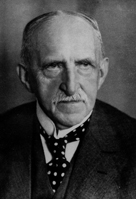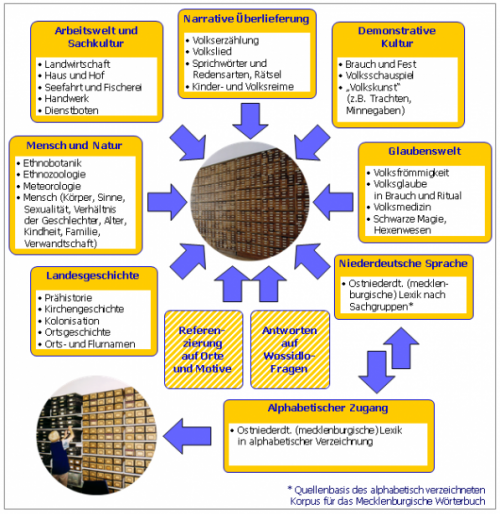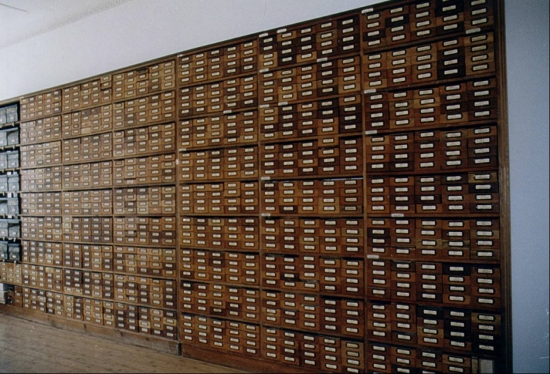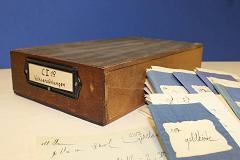Collection (english)
Kind, complexity, systematics, content and significance of the special collection
Content and significance of the special collection
It was three long-term developments, Richard Wossidlo initiated: He established the local Volkskunde, the “Mecklenburgisches Wörterbuch” (a dictionary of Eastern Low German language) and the ethnographic (volkskundlichen) branch of museums in Mecklenburg. Working as a teacher for Latin and Greek at a school in Waren, he himself rates among the “founding fathers” of the Volkskunde in the German speaking area and his archive among the eldest institutions of the discipline. He showed the way forward for ethnologic fieldwork and reflected on his methods long before Bronislaw Malinowski, t h e father of modern fieldwork. Wossidlo’s way of collecting in the field was exemplary for the young discipline of Volkskunde. He entered the field as a self-taught ethnographer and knew the language of his fellow people and the way they thought. He methodically outgrew "arm chair scholars" who got records by correspondents. These records they edited and interpreted even though they had never (or rarely) undertaken fieldwork by themselves. Nevertheless Wossidlo also briefed and educated helpers as local field researchers. By and by he created a network containing hundreds of helpers (Gewährsleute), who recorded special items of traditional folk culture and sent him their notes. Wossidlos self-perception was that of a regional collector that intended to deepen the nation-wide work of Jacob and Wilhelm Grimm. The territorial cohesion of his collection corresponds with the attempt at describing all forms of expression of traditional folk culture. It comprises the Grimm brothers’ repertoire from verbal utterances to item-related culture (which he illustrated at the “Bauernmuseum Richard Wossidlo”, at the castle of Schwerin, opened 1936).
Thus far he collected folktales (fairy tales, legends, religious tales, jokes, and anecdotes), proverbs and sayings, folk songs, nursery rhymes and which games children played. He also took notes on customs and festivals, seafaring, fishing and farming, trade and domestic servitude, housing, clothing, livery, childhood, growing up, aging, dying and death, ways of thinking, feelings of people, their body, mind and sexuality. Additionally, he took notes on regional mentalities, experiences of strangeness as well as those of outcasts. He collected data on local settlement- and parish-history, on place names (toponyms), ethnobotanic and zoological matters and much more.
Besides that, he took notes on the Eastern Low German language variety in Mecklenburg, according to sub-grouped topics. He assorted expressions by semantic relations and described situational use. Thus, his alphabetic catalogue (MWW) – a preliminary stage to the "Mecklenburgisches Wörterbuch" – is accounted by extra-linguistic criteria, pragmatic and semantic relations (with synonyms as their main interest), social and regional aspects and idiomatic expressions.
Wossidlo's notes on the collected material were taken in abbreviated form with the attempt to vernacular tojne of the speaker. His notes comprise varieties of different witnesses, generating whole series. Detailed minutes of Wossidlo's informants, a variety of notes, and hints pointing to printed sources are also accessible for archive users.
Kind, complexity, systematics, content and significance of the special collection
The special collection consists of:
- ZAW Systematisches Zettelarchiv Wossidlos - fact-oriented and assorted archive of 1.200 documents
- BKW Beiträgerarchiv Richard Wossidlos - interlinked with the ZAW correspondence archive from Wossidlo and his contributors. 54.000 foliae attachements.
- MWW Mecklenburgisches Wörterbuch Wossidlo – deduced from ZAW and BKW, alphabetically ordered extract for the Mecklenburgian Dictionary. 500.000 documents.
- MWT Mecklenburgisches Wörterbuch Teuchert – alphabetic collection fro the Mecklenburgian Dictionary by Herman Teuchert. Both MWW and MWT are the basis for the seven-volume-broad vernacular Mecklenburgian Dictionary. 500.000 documents.
- NRW Nachlass Richard Wossidlos – relevant subgroup of Wossidlo’s estate, in terms of the origin and context of the collection e.g. early collection scripts, journal entries, correspondence with scholars 135.000 documents



